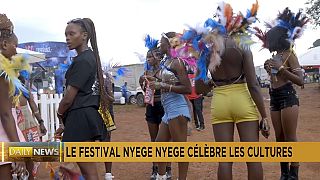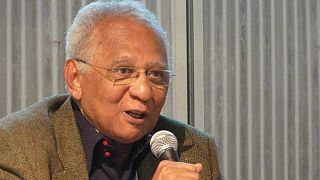Haiti
Hundreds of revelers attended the Day of the Dead festival in the main cemetery of the capital, Port-au-Prince.
The festival in Haiti is known as Fet Gede. Vodou practitioners dress in white and paint their faces to represent the "spirits" — called gede — "the dead".
Many in the crowd surrounded the tomb of the first person buried in the Port-au-Prince cemetery, believing it contains the guardian of the dead, known in Haitian Vodou as Baron Samedi.
Revelers offered candles and money to a Vodou priest as he spits moonshine on the faces of practitioners with some of them shaking and stumbling as they received the spirit of the dead.
The moonshine is known as cleren, rum laced with hot peppers marinating inside.
Wooden bowls with plantains, fish, bread, avocados and anything decorated with human skulls are offered to dead relatives or friends.
The celebrations come at a time of increased violence and misery in Haiti.
More than 1,230 killings and 701 kidnappings were reported across Haiti from July 1 to Sept. 30, more than double that reported during the same period last year, according to the U.N.
An estimated 200 gangs operate in Haiti, with the largest groups controlling up to 80% of the capital of Port-au-Prince.
Vodou is an official and widely practiced religion in Haiti, where it is practiced widely in the country of more than 11 million people. It was born in the 16th century when slaves from West Africa who were forced to practice Catholicism combined the saints with spirits in African religions.












Go to video
Angélique Kidjo makes history as first black African artist on Hollywood Walk of Fame
02:07
Anxiety grips Haitian community in United States over termination of protected status
01:35
UN and Haitian officials mark one year since Kenyan police arrived to support security efforts
02:18
Netherlands returns 119 artifacts looted from Nigeria
Go to video
Haitians in US and at home reeling from US travel ban that takes affect on Monday
01:06
Haiti health officials meet to discuss shortage of HIV/AIDS medication